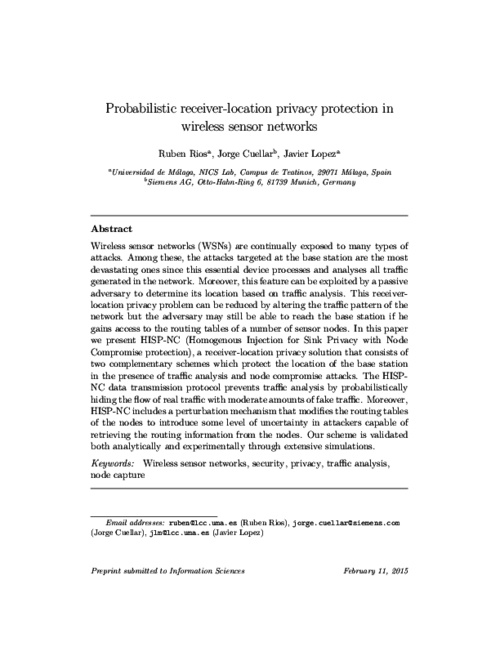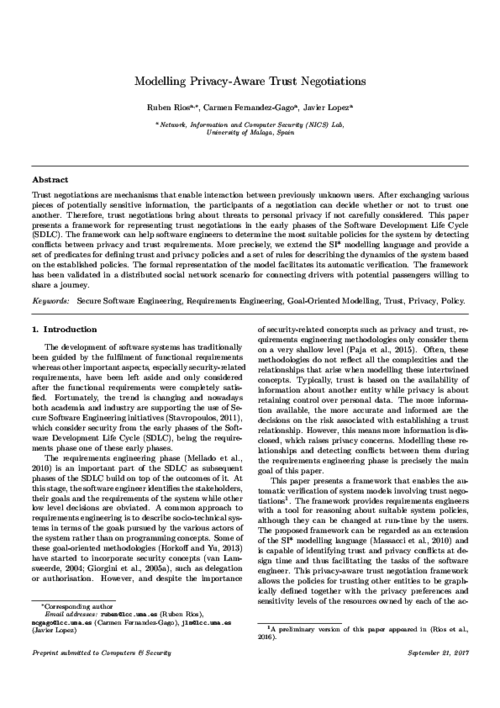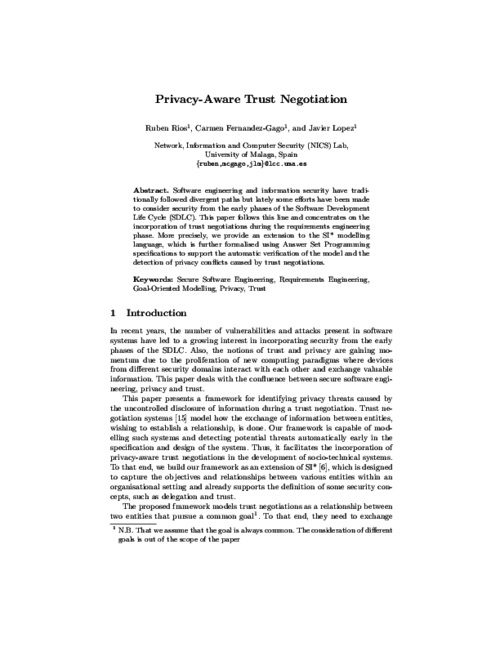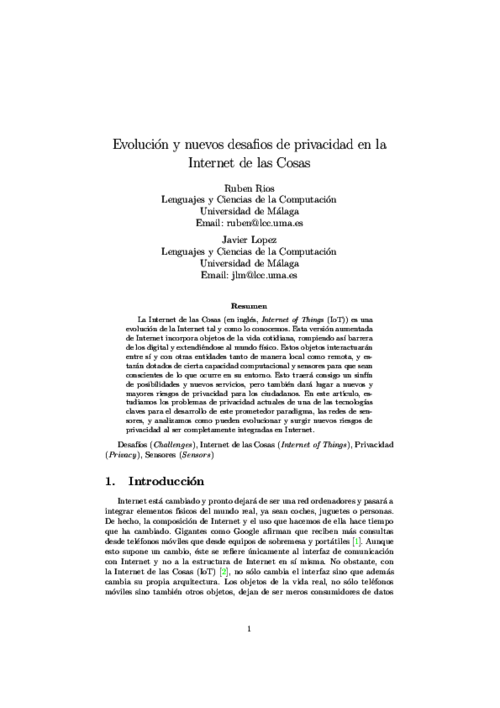 ] Title Type Year
] Title Type Year Information Sciences, vol. 321, Elsevier, pp. 205 - 223, 07/2015. DOI
Abstract
Wireless sensor networks (WSNs) are continually exposed to many types of attacks. Among these, the attacks targeted at the base station are the most devastating ones since this essential device processes and analyses all traffic generated in the network. Moreover, this feature can be exploited by a passive adversary to determine its location based on traffic analysis. This receiver-location privacy problem can be reduced by altering the traffic pattern of the network but the adversary may still be able to reach the base station if he gains access to the routing tables of a number of sensor nodes. In this paper we present HISP-NC (Homogenous Injection for Sink Privacy with Node Compromise protection), a receiver-location privacy solution that consists of two complementary schemes which protect the location of the base station in the presence of traffic analysis and node compromise attacks. The HISP-NC data transmission protocol prevents traffic analysis by probabilistically hiding the flow of real traffic with moderate amounts of fake traffic. Moreover, HISP-NC includes a perturbation mechanism that modifies the routing tables of the nodes to introduce some level of uncertainty in attackers capable of retrieving the routing information from the nodes. Our scheme is validated both analytically and experimentally through extensive simulations.

Computers & Security, vol. 77 , issue August 2018, Elsevier, pp. 773-789, 2018. DOI
Abstract
Trust negotiations are mechanisms that enable interaction between previously unknown users. After exchanging various pieces of potentially sensitive information, the participants of a negotiation can decide whether or not to trust one another. Therefore, trust negotiations bring about threats to personal privacy if not carefully considered. This paper presents a framework for representing trust negotiations in the early phases of the Software Development Life Cycle (SDLC). The framework can help software engineers to determine the most suitable policies for the system by detecting conflicts between privacy and trust requirements. More precisely, we extend the SI* modelling language and provide a set of predicates for defining trust and privacy policies and a set of rules for describing the dynamics of the system based on the established policies. The formal representation of the model facilitates its automatic verification. The framework has been validated in a distributed social network scenario for connecting drivers with potential passengers willing to share a journey.

12th International Workshop on Security and Trust Management (STM), vol. LNCS 9871, Springer, pp. 98-105, 09/2016. DOI
Abstract
Software engineering and information security have traditionally followed divergent paths but lately some efforts have been made to consider security from the early phases of the Software Development Life Cycle (SDLC). This paper follows this line and concentrates on the incorporation of trust negotiations during the requirements engineering phase. More precisely, we provide an extension to the SI* modelling language, which is further formalised using answer set programming specifications to support the automatic verification of the model and the detection of privacy conflicts caused by trust negotiations.

XIV Reunión Española sobre Criptología y Seguridad de la Información, pp. 209-213, 10/2016.
Abstract
La Internet de las Cosas (en inglés, Internet of Things (IoT)) es una evolución de la Internet tal y como lo conocemos. Esta nueva versión de Internet incorpora objetos de la vida cotidiana, rompiendo así barrera de los digital y extendiéndose al mundo físico. Estos objetos interactuarán entre sí y con otras entidades tanto de manera local como remota, y estarán dotados de cierta capacidad computacional y sensores para que sean conscientes de lo que ocurre en su entorno. Esto traerá consigo un sinfín de posibilidades y nuevos servicios, pero también dará lugar a nuevos y mayores riesgos de privacidad para los ciudadanos. En este artículo, estudiamos los problemas de privacidad actuales de una de las tecnologías claves para el desarrollo de este prometedor paradigma, las redes de sensores, y analizamos como pueden evolucionar y surgir nuevos riesgos de privacidad al ser completamente integradas en la Internet.
